by [email protected] | Jun 30, 2021 | Prescriptions for your Practice
Podcast: Play in new window | Download
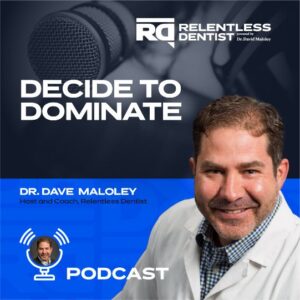
Decide to Dominate
Results are going to come from taking action. And all action starts with a decision.
Having to decide on something is naturally hard, most especially if the decision is transformative. However, decisive leadership is vital to effectively execute the plan of action toward achieving the organization’s goals.
This week’s podcast is about creating a culture of decisiveness, how to empower your team to make more and better decisions, the elements that make up a sound decision, and its impact on the organization’s overall well-being. We will also look into the psychology of “learned helplessness” — a situation where people deliberately put out a minimum viable effort to avoid trouble due to a vague instruction from a high-performance-seeking indecisive leader.
Tune in and find solutions to common practice issues at Prescriptions for Your Practice.
Key Quotes:
- “What was the number 1 characteristic of a high-performance culture or a high-performance team? I said immediately, DECISIVENESS.”
- “Decide to dominate. For me, dominate means dominating a day, knowing that we have, as a dental team, control over the day and an opportunity to get better than we were yesterday.”
- “If we’re not decisive, we can expect that our teams will also be indecisive.”
- “If we want results, we need to be decisive.”
- “If a team is consistently making more and better decisions across the board, it’s bound to generate more revenues, more fulfillment, and less stress.”
- “The quicker we make these decisions, the better off we’ll gonna be, the better off the organization is gonna be, and now we start to see the organization reflect the leader and become more decisive.”
- “We need to encourage our people to make mistakes and learn from them.”
- “The best thing you can do for your team is giving them reasons to stay hopeful and optimistic.”
Featured on the Show:


by [email protected] | Jun 16, 2021 | Prescriptions for your Practice
Podcast: Play in new window | Download
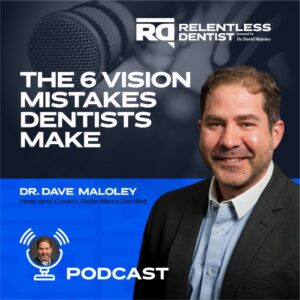 In this episode, I will expound on The 6 Vision Mistakes Dentists Make. I will discuss how crafting a clear vision supports the team’s growth and reinforces the practice effectively.
In this episode, I will expound on The 6 Vision Mistakes Dentists Make. I will discuss how crafting a clear vision supports the team’s growth and reinforces the practice effectively.
More than ever, dentists need to have a well-defined mission and a compelling vision to reinforce their practice, not only for themselves but also for their staff and patients. It provides a clear and consistent direction as to where the practice is going.
Faced with many challenges aggravated by these uncertain times, dentists need to run a successful business to avoid plateaus. One key aspect of strengthening the business is value-creation among the team steered by a well-executed vision. It has to be big enough to fit all of the employees’ dreams and hopes in it.
What does your practice look like five years from now?
Tune in and find solutions to common practice issues at Prescriptions for Your Practice
Key Quotes:
- “It’s important that we have a vision and we execute that properly.”
- “Execution without vision creates friction.”
- “Your vision has to be big enough to fit all of your employees’ dreams and hopes in it.”
- “Being flexible and strategy is important once we define our mission and our vision.”
- “Vision needs to stir excitement and emotion.”
- “We need to evolve as humans.”
- “We need to grow our practice by growing our people.”
- “Make sure that you’re willing to become something much more.”
Featured on the Show:


by [email protected] | Jun 9, 2021 | Prescriptions for your Practice
Podcast: Play in new window | Download
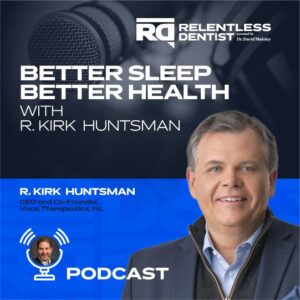
Mild to moderate obstructive sleep apnea (OSD) can lead to a wide variety of health risks. Yet, more than 80% of people with OSD are utterly unaware that they are suffering from this condition.
In today’s episode, I am very excited to have Kirk Huntsman, the CEO and Co-Founder of Vivos Therapeutics, Inc.; a medical technology company that focuses on developing a non-surgical, non-invasive, non-pharmaceutical, and low-cost solution for patients with sleep-disordered breathing, including mild to moderate sleep apnea.
Kirk is a well-known figure in the dental profession. In 1995 he founded Dental One Partners (formerly Dental One) and grew it to over 165 locations in 15 states. In 2010 he was appointed as CEO of ReachOut Healthcare America, and in 2012, Kirk founded Xenith Practices, LLC. He founded and served as the Chief Executive Officer of Ortho Ventures, LLC in 2014, and in November of 2015, he joined First Vivos, Inc. as its CEO.
Recently, Vivos launched VivoScore Diagnostic Technology. It is a comprehensive home sleep apnea test for children and adults. It includes a proprietary ring-like device that you can slide into your finger overnight while you’re sleeping in the comfort of your home.
If you want to take better care of your patients, you would be interested to listen to this episode.
Tune in and find solutions to common practice issues at Prescriptions for Your Practice
Key Quotes:
- “As I built a successful dental practice brokerage business, I quickly understood that dentists struggle with some of the clinical and managerial aspects.”
- “You want to differentiate your services offering from every other Yahoo in the marketplace. And so we were trying to figure out what we could do that was different.”
- “I decided I would take the orthodontic courses. I said, look, guys, you guys follow me, and I’ll do this with you. If I can do it, you can do it. “
- “I was probably the only business guy on the planet that had the clinical perspective, as well as the business background.”
- “The doctors have got to feel confident enough in the technology and competent enough with it that they can go into the operatory, sit down with the patient, close the case and never look back. The patient will have a great experience, and they’re [doctors] going to have a great experience.”
- “You don’t need to be in intervention for a lifetime. Would you rather have a mandibular advancement case that you’re married to for life, or would you rather have the opportunity to celebrate victory in 12 to 18 months and be done with that case?”
- “I appreciate how this all comes together and adding quality and quantity of life for patients and family members.”
- “ADA has recommended that all dentists screen all their patients for sleep apnea. That’s now becoming the standard of care.”
Featured on the Show:


by [email protected] | Jun 2, 2021 | Prescriptions for your Practice
Podcast: Play in new window | Download
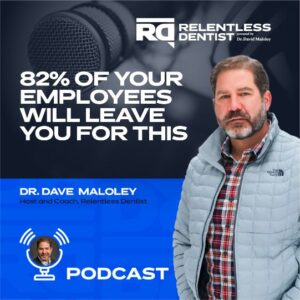 “We have two ears and one mouth so that we can listen twice as much as we speak.” — Epictetus
“We have two ears and one mouth so that we can listen twice as much as we speak.” — Epictetus
Listening is the single most essential skill in business, particularly in dental practice. Poor listening skills may lead to assumptions and misunderstanding that will eventually result in ineffective decisions and costly mistakes. It further deteriorates team cohesion and causes a lot of tension and stress.
Effective listening should be attentive, responsive, and active. Pay close attention to non-verbal expressions to understand and decode the messages correctly. Functional listening promotes healthy organizational relationships, encourages creativity and innovation, and fosters a positive culture among employees and the organization.
In this episode, I will talk about dental business owners retain great employees, nurture their growth, and provide them with tools for success to keep them dedicated to their practice, your leadership, and your customers — all because of active listening.
Tune in and find solutions to common dental practice issues at Prescriptions for Your Practice
Key Quotes:
- “When somebody leaves the nest and they graduate, these parents extend the trust that they will find good workplaces that take care of them.”
- “Good employees leave and you think that they leave for more money, but that’s not the case.”
- “The first key to active listening is giving someone all of your attention.”
- “The second step is to step into the conversations with genuine curiosity.”
- “Active listening means digging deeper because they don’t know how to articulate themselves and you need to ask exploratory questions.”
- “If you’re able to listen and they’re able to be heard, sometimes that’s enough for their needs to be met immediately.”
- “If you give your team, your patients, an undivided attention and you dive deeper to fully understand them, they will be committed and loyal to you and you can continue this reciprocal exchange because the offspring of active listening is trust.”
Featured on the Show:


by [email protected] | May 26, 2021 | Prescriptions for your Practice
Podcast: Play in new window | Download
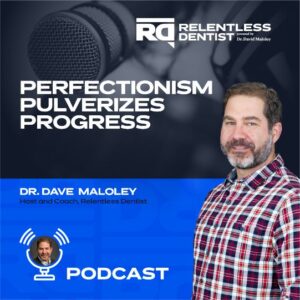
Where in your relationships, your health, your financial situation, your clinical dentistry, can the realism of progress take precedence over the fantasy of perfection?
At one point in our life, we have been in a situation wherein we strive to be perfect, only to realize that it is only an illusion that we put upon ourselves out of fear of criticism and rejection.
The key to perfection is acknowledging that it doesn’t exist.
Perfection is fiction, and it can be destructive. I’m not saying that you should lower your standards. Set high standards and strive for excellence, not perfection. You can only achieve success through progressive action.
Listen in as I discuss pointers on how you can identify areas of your life or business where the standard of “perfection” should be replaced with progress.
Tune in and find solutions to common practice issues at Prescriptions for Your Practice
Key Quotes:
- “When it came time for me to cross the finish line, I looked up at my time and the critic turned on, and I was starting to think of ways that should have improved my time and why the time wasn’t good enough. The standard of finishing immediately changed, and I was looking for opportunities where I could have perfected that run.”
- “That is a metaphor for a lot of or our lives. Where is that perfectionism that we’re trained to notice these meticulous details in the mouth, the dentistry that we’re doing, the margins, the bone levels? We’re down to millimeters and microns and that works really well in dentistry, but it can create all sorts of problems with their teams, with their families, in our life.”
- “We create these environments where there’s learned helplessness because our team thinks ‘Well, I can never live up to the doctor’s standards so why even try? I’m not even gonna put up the effort because I’m getting criticized.’ So, it starts to hamper our relationships.”
- “What is perfect? The reality is it doesn’t exist.”
- “The solution isn’t to really lower your standards. But we have to appreciate that the path to mastery is messy. Whenever you start on anything, you suck at it. So you have to give yourself permission to suck and get better, and better, and better.”
- “The solution is making peace with imperfection and falling in love with process and progress.”
- “Human desire isn’t perfection, it is connection.”
- “Understand that we have to change habits to change identity. Once we start to build that confidence, then the success and the progress are inevitable.”
- “Perfection leads to procrastination.”
Featured on the Show:


Page 31 of 33« First«...1020...2930313233» 





 “We have two ears and one mouth so that we can listen twice as much as we speak.” — Epictetus
“We have two ears and one mouth so that we can listen twice as much as we speak.” — Epictetus